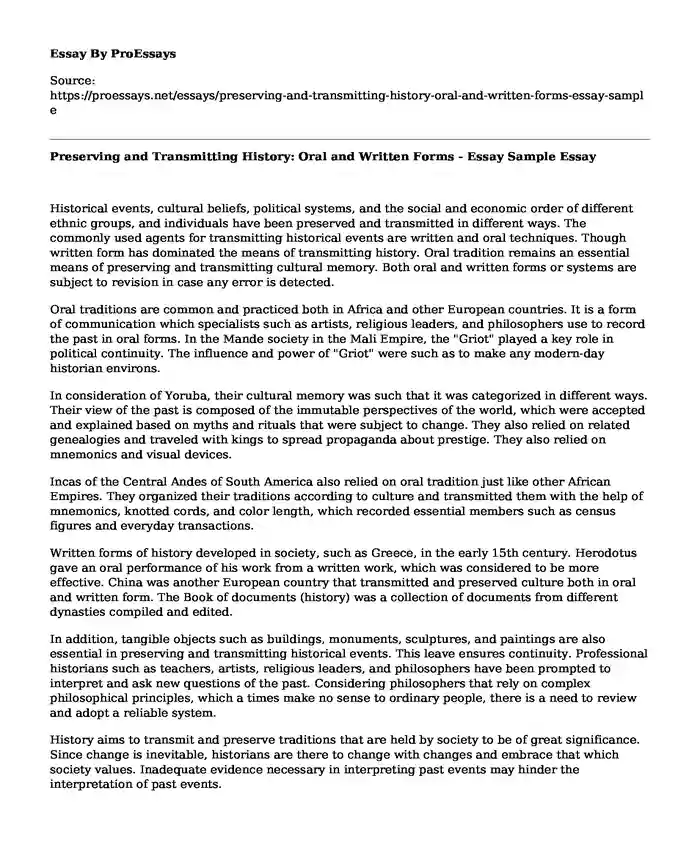Historical events, cultural beliefs, political systems, and the social and economic order of different ethnic groups, and individuals have been preserved and transmitted in different ways. The commonly used agents for transmitting historical events are written and oral techniques. Though written form has dominated the means of transmitting history. Oral tradition remains an essential means of preserving and transmitting cultural memory. Both oral and written forms or systems are subject to revision in case any error is detected.
Oral traditions are common and practiced both in Africa and other European countries. It is a form of communication which specialists such as artists, religious leaders, and philosophers use to record the past in oral forms. In the Mande society in the Mali Empire, the "Griot" played a key role in political continuity. The influence and power of "Griot" were such as to make any modern-day historian environs.
In consideration of Yoruba, their cultural memory was such that it was categorized in different ways. Their view of the past is composed of the immutable perspectives of the world, which were accepted and explained based on myths and rituals that were subject to change. They also relied on related genealogies and traveled with kings to spread propaganda about prestige. They also relied on mnemonics and visual devices.
Incas of the Central Andes of South America also relied on oral tradition just like other African Empires. They organized their traditions according to culture and transmitted them with the help of mnemonics, knotted cords, and color length, which recorded essential members such as census figures and everyday transactions.
Written forms of history developed in society, such as Greece, in the early 15th century. Herodotus gave an oral performance of his work from a written work, which was considered to be more effective. China was another European country that transmitted and preserved culture both in oral and written form. The Book of documents (history) was a collection of documents from different dynasties compiled and edited.
In addition, tangible objects such as buildings, monuments, sculptures, and paintings are also essential in preserving and transmitting historical events. This leave ensures continuity. Professional historians such as teachers, artists, religious leaders, and philosophers have been prompted to interpret and ask new questions of the past. Considering philosophers that rely on complex philosophical principles, which a times make no sense to ordinary people, there is a need to review and adopt a reliable system.
History aims to transmit and preserve traditions that are held by society to be of great significance. Since change is inevitable, historians are there to change with changes and embrace that which society values. Inadequate evidence necessary in interpreting past events may hinder the interpretation of past events.
A scenario of such kind prompts varying questions on whether the validity of a historical event should hold universally. Time and climate changes have a great impact on historical representations, which are used to predict and interpret the past. It is, therefore, important to note that the way the historical event is interpreted at one point may differ from that at another point.
Conclusion
To conclude, human culture is essential for the generation to come. It should, therefore, be preserved and transmitted in a manner that the future generation will interpret with ease and embrace. Historians should bear in mind that changes are there with us and affect historical objects which calls for reviewing and updating existing historical facts to match the historical objects available.
Cite this page
Preserving and Transmitting History: Oral and Written Forms - Essay Sample. (2023, Nov 28). Retrieved from https://proessays.net/essays/preserving-and-transmitting-history-oral-and-written-forms-essay-sample
If you are the original author of this essay and no longer wish to have it published on the ProEssays website, please click below to request its removal:
- Case Study: Pfizer Diversity and Inclusion
- The Triumph of Conservatism in American Essay Example
- Discussion Board Example: Workforce Diversity as a Nursing Trend
- Essay Example on Greeks and Their Gods: A Special Relationship
- Essay Sample on Revolutionary Wars That Shaped America: Bacon's Rebellion & Glorious Revolution
- Native Americans' Economic Growth and Prosperity During 1865-1898: A Brief History - Essay Sample
- Paper Sample: The Manhattan Project and the Role of Scientists in the Development and Use of Atomic Bombs







